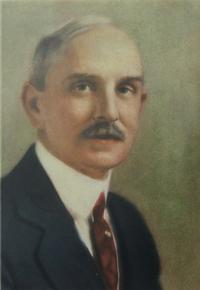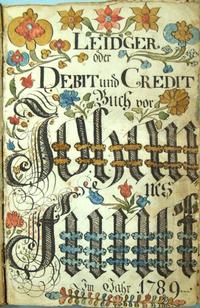The Borneman Pennsylvania German Manuscript Collection Soon Available Online
By Janine P.This is the first of many blog posts about The Borneman Pennsylvania German Manuscript Collection, which has been part of the Rare Book Department at the Free Library of Philadelphia (FLP) since 1955. Thanks to a 2011 grant from the prestigious Save America’s Treasures program, a select number will soon be restored to pristine condition, and digitized for online access. You will find manuscript descriptions of every item, as well as a select number of fully digitized FLP e-books.
The initial digitization of the collection began in 2009 when more than 1,000 Fraktur pieces were fully digitized, and put online. This is one of the largest public Fraktur collections in existence, and is intended as “an ongoing and dynamic resource for public and scholarly information about Pennsylvania German families, history, and folk art.” Take a tour of the collection to appreciate just what that means. Among its assortment of birth and baptismal certificates, writing samples, awards, cutwork, letters from heaven, Christmas and New Year greetings, you will also find exquisite bookplates such as the bookplate for Johannes Funck, which is in the debit and credit ledger for which it was made.
This ledger is an example of the more than 174 eighteenth and nineteenth century Borneman Collection manuscripts taken from several small communities in Lancaster County and Southeastern Pennsylvania. They are eyewitness accounts of the commercial, religious, legal, and cultural practices of the period, and you will soon be able to enjoy their contents online. Johannes Funck’s account book will come alive as you meet his customers and learn about his trade as a tanner. You’ll be fascinated by many other interesting entries in this ledger, jotted down sometimes in German, and sometimes in English and reflecting Funck’s day-to-day activities, and thoughts. You will find the ordinary things of yesterday quite extraordinary!
Twenty-five of the manuscripts are currently at the Conservation Center for Art & Historic Artifacts (CCAHA) in Philadelphia for conservation treatment. As noted on the CCAHA website: “Some have deteriorated covers and flaking leather bindings, and all need surface cleaning. The iron-gall ink used in many of the manuscripts has corroded, resulting in damage and loss to the ink and paper…”
The restoration of these valuable links to America’s past will guarantee that the originals will be preserved for future generations. Their digitization and availability online will provide a global audience unlimited instantaneous access to the fascinating and valuable historic observations of common and not so common men from a very important time and place in American history.
We owe the existence of these treasures to Henry S. Borneman, Esq., founder and first dean of the School of Law at Temple University. Borneman was very proud of his Pennsylvania German heritage, and at age 10 started to avidly collect books and manuscripts pertaining to the cultural transformation of these Germanic-speaking people, who for religious reasons or otherwise had immigrated to Pennsylvania during the late seventeenth, eighteenth, and nineteenth centuries. His love of books and manuscripts through the years showed a scholar’s touch and a book collector’s erudition, and his appreciation of beauty and a desire to possess treasures no one else had ensured his collection would be like none other. He devoted himself to acquiring a library which reflected the essence of Pennsylvania German art and culture.
Upon Borneman’s death in January 1955 at age 84, his family engaged the firm of Charles Sessler, a Philadelphia dealer in rare books and prints, to find a buyer for the collection. The asking price was $50,000. This was a formidable amount of money, and the competition among such giants as the University of Pennsylvania, the Free Library of Philadelphia, and the Library Company of Philadelphia was enormous. Ellen Shaffer, then rare book librarian at FLP, thought that all praise should go to Moncure Biddle, a member of the Board of Trustees, who single-handedly within a twenty-four hour period arranged the acquisition before either Emerson Greenaway, Director of FLP, or she knew about it. It was the largest acquisition through purchase in its history, and George H. Eckhardt, author and close friend of Henry Borneman, sagaciously pointed out in his letter of congratulations to Dr. Emerson Greenaway on June 13, 1955 that the institution fortunate enough to have the Borneman Collection would become a focal point of Pennsylvania history and research.
Preservation of the Free Library of Philadelphia's Pennsylvania German manuscript collection has been made possible in part by a major grant from the National Endowment for the Humanities: Because democracy demands wisdom. Any views, findings, conclusions, or recommendations expressed in this post do not necessarily represent those of the National Endowment for the Humanities.
Have a question for Free Library staff? Please submit it to our Ask a Librarian page and receive a response within two business days.



